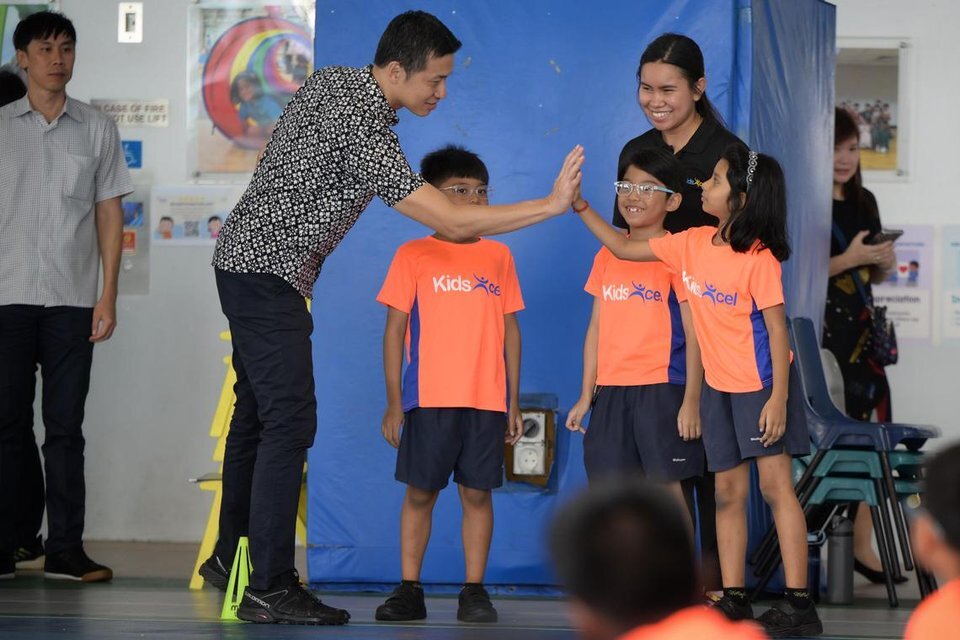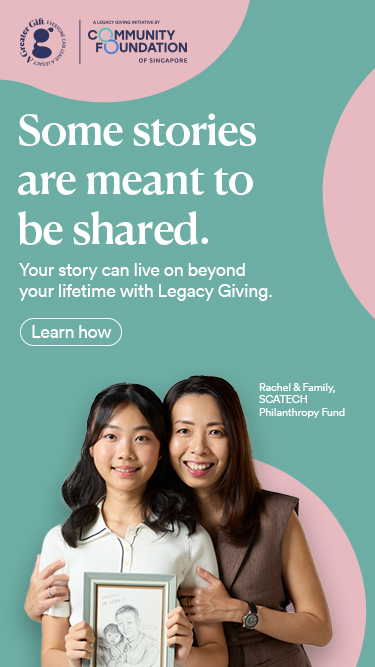The Business Times: DAFs still quite new concept: charities index


SINGAPORE was among the top 10 most generous countries in 2018 – according to CAF World Giving Index published by Charities Aid Foundation, a British charity – with 58 per cent willing to donate money to a charitable cause.
However, according to calculations by the Community Foundation of Singapore (CFS), a non-profit organisation that encourages and enables philanthropy in Singapore, just 1.1 per cent of total giving in Singapore in 2017 was to donor advised funds (DAFs), as it is still a relatively new concept.
DAFs are charitable fund accounts that people or organisations can open. An amount of money will be pledged to a cause they are passionate about.
CFS, which started in 2008, has 115 charitable funds. It has raised S$130 million in donations and given out S$65 million in grants.
Laurence Lien, former chairman of CFS, said: “When we first started, there were not a lot of donor-centric vehicles and we sensed that in Singapore, a lot of people say ‘I want to give’, but they do not know how, or the thought of starting a foundation or charitable trust was just so overwhelming.
“Setting up a foundation or a charitable trust is so expensive, and that made them put it off for such a long time.”
He added that for people to be able to start something at the snap of their fingers, “there is definitely a gap in the market for that”.
Mr Lien said that DAFs are motivating philanthropists to think more about the cause they would like to donate funds to and how their donations will help to solve the problem. Some donors with DAFs are willing to come together and discuss ways that they can further make a great impact on complex social issues as they get personally invested in a cause.
CFS has hosted some initiatives, such as Singapore Youth Impact Collective, and the collaboration with National Volunteer & Philanthropy Centre, Colabs, to help facilitate discussions between such donors.
“Such initiatives help connect the benefactors, charities and donors, and by discussing social issues that need to be addressed, it helps to pinpoint the wider societal problem that needs to be tackled,” said Mr Lien.
When comparing the trend of volunteerism between Singapore and a Western country such as the United States, Eileen Heisman, president and CEO of National Philanthropic Trust (NPT), a non-profit based in the US, noted that for the US, rates of volunteering are going down, whereas in Singapore, there is an upward trend.
This is crucial, as Ms Heisman has observed that when donors volunteer their services and see first-hand what is going on, the issue feels much more personal for them and makes them more committed to the cause.
She added: “I recommend donors to stay with a cause for five to seven years before moving on to a new cause as charities need sustainable funding.”
Mr Lien also encourages volunteerism before moving on to monetary donations, pointing out that there are certain skill sets such as marketing, that volunteers can help with.
Mr Lien said: “I am aware that CFS is limited in providing such support to charities and I am supportive of volunteers who are able to directly lend their support to charities through this method.”
When asked about the public distrust towards Singaporean charities due to past scandals, Mr Lien felt that it was unfair that local charities are being grouped together and condemned just because of one such organisation got exposed for mishandling funds in the past even though the rest are doing “fantastic work”.
To regain public confidence, Mr Lien added that organisations such as CFS help donors do due diligence on the chosen charity to ensure that their money is being put to good use.
Donors who set up funds with CFS receive a six-monthly donor statements with updates on their fund balance, donation history, and grants disbursed.
Mr Lien said: “I find that the bigger risk is giving it to a charity that will not use your money at all because they have so much of it. If donors choose to do it alone, they usually go for brand names, but if you look at the balance sheet of these brand names, they sometimes have billions squirrelled away.”
Ms Heisman concurred and said that charities are required to do tax returns and such information is accessible to the public online.
“These measures help create transparency for the organisation and donors, and help donors make a more informed donation to their charity of choice.” She added that smaller charities tend to come up with new solutions for old problems which are much more effective, and funding a small charity is like “funding a startup business” as they are more innovative and are like disruptors.
She added that smaller charities tend to come up with new solutions for old problems which are much more effective, and funding a small charity is like “funding a startup business” as they are more innovative and are like disruptors.
“It is much easier to explain the concept of DAFs to donors now as the idea is becoming more prevalent in the US. I think because of Web-based banking, the case and speed at which you can get information has made DAFs more popular with people.”
Source: Business Times © Singapore Press Holdings Limited. Permission required for reproduction.
SINGAPORE was among the top 10 most generous countries in 2018 – according to CAF World Giving Index published by Charities Aid Foundation, a British charity – with 58 per cent willing to donate money to a charitable cause.
However, according to calculations by the Community Foundation of Singapore (CFS), a non-profit organisation that encourages and enables philanthropy in Singapore, just 1.1 per cent of total giving in Singapore in 2017 was to donor advised funds (DAFs), as it is still a relatively new concept.
DAFs are charitable fund accounts that people or organisations can open. An amount of money will be pledged to a cause they are passionate about.
CFS, which started in 2008, has 115 charitable funds. It has raised S$130 million in donations and given out S$65 million in grants.
Laurence Lien, former chairman of CFS, said: “When we first started, there were not a lot of donor-centric vehicles and we sensed that in Singapore, a lot of people say ‘I want to give’, but they do not know how, or the thought of starting a foundation or charitable trust was just so overwhelming.
“Setting up a foundation or a charitable trust is so expensive, and that made them put it off for such a long time.”
He added that for people to be able to start something at the snap of their fingers, “there is definitely a gap in the market for that”.
Mr Lien said that DAFs are motivating philanthropists to think more about the cause they would like to donate funds to and how their donations will help to solve the problem. Some donors with DAFs are willing to come together and discuss ways that they can further make a great impact on complex social issues as they get personally invested in a cause.
CFS has hosted some initiatives, such as Singapore Youth Impact Collective, and the collaboration with National Volunteer & Philanthropy Centre, Colabs, to help facilitate discussions between such donors.
“Such initiatives help connect the benefactors, charities and donors, and by discussing social issues that need to be addressed, it helps to pinpoint the wider societal problem that needs to be tackled,” said Mr Lien.
When comparing the trend of volunteerism between Singapore and a Western country such as the United States, Eileen Heisman, president and CEO of National Philanthropic Trust (NPT), a non-profit based in the US, noted that for the US, rates of volunteering are going down, whereas in Singapore, there is an upward trend.
This is crucial, as Ms Heisman has observed that when donors volunteer their services and see first-hand what is going on, the issue feels much more personal for them and makes them more committed to the cause.
She added: “I recommend donors to stay with a cause for five to seven years before moving on to a new cause as charities need sustainable funding.”
Mr Lien also encourages volunteerism before moving on to monetary donations, pointing out that there are certain skill sets such as marketing, that volunteers can help with.
Mr Lien said: “I am aware that CFS is limited in providing such support to charities and I am supportive of volunteers who are able to directly lend their support to charities through this method.”
When asked about the public distrust towards Singaporean charities due to past scandals, Mr Lien felt that it was unfair that local charities are being grouped together and condemned just because of one such organisation got exposed for mishandling funds in the past even though the rest are doing “fantastic work”.
To regain public confidence, Mr Lien added that organisations such as CFS help donors do due diligence on the chosen charity to ensure that their money is being put to good use.
Donors who set up funds with CFS receive a six-monthly donor statements with updates on their fund balance, donation history, and grants disbursed.
Mr Lien said: “I find that the bigger risk is giving it to a charity that will not use your money at all because they have so much of it. If donors choose to do it alone, they usually go for brand names, but if you look at the balance sheet of these brand names, they sometimes have billions squirrelled away.”
Ms Heisman concurred and said that charities are required to do tax returns and such information is accessible to the public online.
“These measures help create transparency for the organisation and donors, and help donors make a more informed donation to their charity of choice.” She added that smaller charities tend to come up with new solutions for old problems which are much more effective, and funding a small charity is like “funding a startup business” as they are more innovative and are like disruptors.
She added that smaller charities tend to come up with new solutions for old problems which are much more effective, and funding a small charity is like “funding a startup business” as they are more innovative and are like disruptors.
“It is much easier to explain the concept of DAFs to donors now as the idea is becoming more prevalent in the US. I think because of Web-based banking, the case and speed at which you can get information has made DAFs more popular with people.”
Source: Business Times © Singapore Press Holdings Limited. Permission required for reproduction.
- Related Topics For You: CHARITY STORIES, DONOR STORIES, DONOR-ADVISED FUND, NEWS, SINGAPORE YOUTH IMPACT COLLABORATIVE

.jpg)

